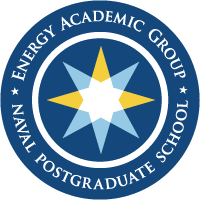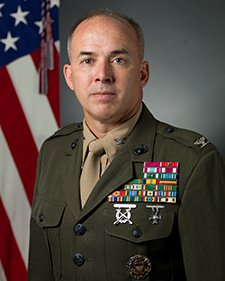August 7, 2015 - Energy Academic Group
Marine Corps Energy Innovation: Extending the Operational Reach of the Force
August 7, 2015
ME Lecture Hall
1300
Col. Jim Caley, USMC
Director, Expeditionary Energy Office (E2O) Headquarters, United States Marine Corps
Abstract
In the last 10 years, the U.S. Marine Corps’ (USMC) requirement for energy on the battlefield has increased exponentially, driven by new and powerful warfighting capabilities. While these capabilities have made the Marine Corps more lethal, they have also had an unintended consequence forces are heavier and dependent on logistic trains that are vulnerable to attack.
In 2009, the Commandant of the Marine Corps (CMC) declared energy a top priority and created the USMC Expeditionary Energy Office (E2O) to help solve the Marine Corps’ energy problems and increase readiness. In 2011, CMC issued the USMC Expeditionary Energy Strategy and Implementation Plan with the goal of increasing combat effectiveness through ethos, efficiency, and renewable energy from “Bases to Battlefield.”
E2O is enhancing the tactical effectiveness of the force, increasing operational reach, and improving readiness by developing and integrating new technologies, giving Commanders unit-level visibility of their energy consumption, and informing the development of the future force.
The USMC has made significant progress in reducing energy use through advancements in equipment and new technology. However, technology alone cannot solve future energy challenges. E2O’s new Energy Command and Control (Energy C2) program will give Commanders a tool to increase energy information, awareness, and control. E2O is also working to advance energy behavior change across the institution. Studies indicate that changing behavior and practices can increase energy efficiency upwards of ~25 percent. Efficiency gains translate directly to mission success, be it in training or in operations.
Biography
Colonel Caley graduated from The Basic School in April of 1990 and was assigned to Headquarters Battery, 11th Marine Regiment, as a Motor Transportation Officer and later as the Battery Executive Officer. He then deployed to Somalia as the Motor Transport Officer with 3d Battalion, 11th Marine Regiment. Upon his return, Colonel Caley was transferred to Marine Wing Support Squadron 272 where he served as the Motor Transport Division Officer in Charge and then the Squadron Logistics Officer.
Following a school assignment, Colonel Caley served on Inspector-Instructor duty with Marine Wing Support Squadron 472. He was transferred to Taegu, Republic of Korea in 1999 where he served as the 3d FSSG Liaison Officer to 19th Theater Support Command. Upon return from Korea, Colonel Caley served as the Operations Officer and Executive Officer for Brigade Service Support Group-1 at Camp Pendleton. From there he deployed as the Executive Officer of Combat Service Support Group-11 to Kuwait and Iraq.
In September of 2004, after attending the School of Advanced Warfare, Colonel Caley served as the Deputy A/CS G-5, USMARFORK. In June 2006, he was transferred back to Camp Pendleton where he served as the Commanding Officer, Combat Logistics Battalion 13, and deployed to Iraq with 13th Marine Expeditionary Unit. Following a year at the Industrial College of the Armed Forces, Colonel Caley was assigned to the Pakistan Afghanistan Coordination Cell on the Joint Staff.
In July of 2011, Colonel Caley was assigned as the Commanding Officer of Combat Logistics Regiment 1, 1st Marine Logistics Group, Camp Pendleton. In July of 2013, he was reassigned to the Expeditionary Energy Office, Headquarters Marine Corps.
Colonel Caley is married to the former Barbara Williams of Kingston, Washington. They have two children, Liam and Kylie.
POC
Dr. Daniel A. Nussbaum
Naval Postgraduate School
Principal, Energy Academic Group
Monterey CA 93943
Phone: 831-656-2387
Mobile: 831-324-3228
Email: dnussbaum@nps.edu


